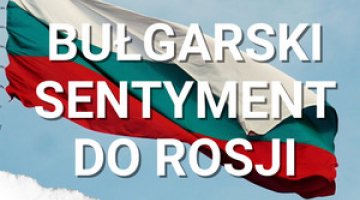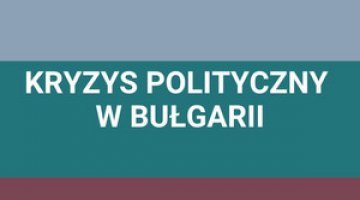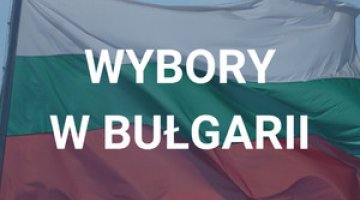Better late than never. Bulgaria’s parliament agrees to supply weapons to Ukraine
In recent weeks there has been an unexpected shift in Bulgaria’s policy with regard to the war in Ukraine. On 3 November the Bulgarian parliament, which was formed following the2 October elections, agreed to supply light weapons to Ukraine. The resolution of the National Assembly was backed by GERB, We Continue the Change (PP), Democratic Bulgaria (DB), the Movement for Rights and Freedoms (DPS) and Bulgarian Rise (BV); the Bulgarian Socialist Party (BSP) and the pro-Russian Revival voted against it. The document is binding for the government and obliges it to prepare a detailed package of military assistance for Ukraine within a month. Dimitar Stoyanov, the Minister of Defence in the interim government which has been operating since August, nevertheless ruled out the possibility of meeting a demand from a section of NATO allies to supply heavy weapons to Ukraine, explaining that Bulgaria did not have the logistic capacity for it and did not wish to weaken its own military potential. However, on 7 November Ukraine’s ambassador to Bulgaria reported that Ukraine had asked Bulgaria to supply 30 types of weapons, including heavy weapons: tanks, armoured personnel carriers, artillery and fighter aircraft.
Commentary
- The Bulgarian parliament’s agreement to provide military assistance to Ukraine marks an important shift in Bulgaria’s course with regard to the war in Ukraine. Along with Hungary, Bulgaria was the last NATO country not to formally supply arms to Ukraine, which was criticised by its NATO allies. Even the government of Kiril Petkov, which functioned from December 2021 to July 2022 and which was viewed as pro-Western resisted the pressure from NATO to provide weapons to Ukraine due to opposition from a coalition partner - BSP. In May the National Assembly agreed to provide Ukraine only with military and technical assistance in the form of repairs of damaged equipment in Bulgarian plants. The declarations of the Ukrainian ambassador to Bulgaria in response to the Bulgarian parliament’s decision regarding weapons supplies may be read as an attempt to continue applying pressure on Bulgaria to send heavy weapons to Ukraine.
- The result of the vote in the National Assembly may be a signal that the new government will adopt a pro-Ukrainian position. Since the parliamentary elections, there have been talks to establish a new government. It cannot be ruled out that the parties which voted for the agreement to provide military assistance to Ukraine (GERB, PP, DPS and BV) will form a majority. In particular BV’s decision can be seen as symptomatic. The party is led by a former prime minister and defence minister Stefan Yanev, and has so far been in favour of a policy of maintaining balance between the West and Russia. Having supported weapon supplies to Ukraine, BV members emphasised that they expected its NATO allies to backfill those weapons which are dispatched to Ukraine and that a new government should present a comprehensive plan to better arm the Bulgarian army in the face of a serious risk of a global armed conflict.
- It is not certain whether a new government will be established as expected above since the leaders of GERB and PP, Boyko Borisov and Kiril Petkov, have been sending contradictory messages regarding it. It cannot therefore be ruled out that a new government will be formed in the next few months when the energy crisis dies down; until that time an interim government will be set up by the country’s president Rumen Radev. The resolution adopted by the Bulgarian parliament also constitutes a form of pressure on the president – even though Radev has condemned the Russian invasion of Ukraine, since it began he has been balancing close to neutrality. Radev has also expressed his reluctance to supply weapons to Ukraine and opposed Ukraine’s NATO membership.
- Bulgaria’s military support has been limited to light weapons in order not to upset Bulgarian society which fears an escalation of the war in Ukraine, and is unwilling to provide arms there. Surveys of public opinion in Bulgaria present an ambivalence in society. Shortly after Russia invaded Ukraine 61% of respondents condemned this act and the percentage of those having a favourable opinion of Vladimir Putin fell from 58% to 32%. In May 40% of those surveyed said they did not support any party in the conflict, 32% were in favour of Ukraine (mainly those voting for PP, GERB, women under 30 and those living in large cities) and 23% supported Russia (the electorate of BSP, men, people over 50, those living in villages and small towns). Towards the end of October nearly 70% of Bulgarians were against weapon supplies to Ukraine.
- It cannot be ruled out that Bulgaria will eventually decide to unofficially supply heavy weapons to Ukraine. Despite the agreement that the parliament adopted in May to limit the country’s military assistance exclusively to repairs of Ukrainian military equipment, there are many signs that Bulgaria has in fact also provided military equipment. According to the Bulgarian Ministry of Defence, from February to May nine flights of Ukrainian aircraft with supplies of ‘defence and military goods’ were made from Varna and Burgas to the Rzeszów-Jasionka airport. Pictures of Bulgarian weapons used in Ukraine appeared in the media, including artillery ammunition of post-Soviet and NATO calibres and T-72 tanks produced in Bulgaria (sold on global markets by a Czech company Excalibur). As ‘Ukrainska Pravda’ reported, until August Bulgaria has provided, though intermediary third countries, over 4,000 tonnes of various military equipment worth as much as 1 billion euros. These estimates are, however, difficult to verify and, furthermore, it is not known whether they include military equipment supplied commercially or financed by other countries.
- Bulgaria is Europe’s sixth largest arms manufacturer and its military companies (e.g. Arsenal JSCo., TEREM, VMZ Sopot, Kintex, Samel 90) occupy an important position on the European market. The Bulgarian military industry specialises in the production and modernisation of post-Soviet arms (in particular AK-related ones), S-300P and S-125 Neva missile systems, Tochka-U tactical ballistic missiles, T-72 tanks and Su-25K and Mig-29A aircraft. In 2021 Bulgaria’s domestic military production exceeded 1 billion lev (approximately 511 million euros) and its main recipients are, apart from NATO states, Asian and African countries.
- Bulgaria’s decision means that the country is ready to pursue a more confrontational policy with regard to Russia. On 8 November the Kremlin announced that it had terminated military and technical cooperation with 74 arms manufacturers from NATO countries, including 15 from Bulgaria. This declaration was purely symbolic because Bulgarian companies had stopped their supplies to Russia when it invaded Ukraine. In Bulgaria it is however regarded as a response to the parliament’s resolution. Tensions between Bulgaria and Russia can also be seen in other areas. On 6 November Bulgaria, in line with EU sanctions, closed its airspace, not giving permission for a plane with Russian Foreign Minister Sergei Lavrov aboard to travel to Belgrade through Bulgaria. Three days later the National Assembly adopted a resolution regarding the acceleration of licensing procedures for supplies of non-Russian fuel to the Kozloduy nuclear power plant – at present fuel is supplied by Russian company TVEL on the basis of a six-year contract signed in 2019. The process is set to be finalised by 2023 and supplies will start in spring 2024.





